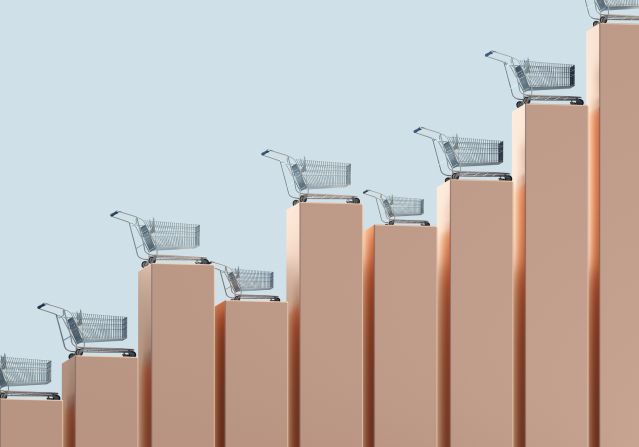Stress
27% of Americans are 'Doom Spending' Due to Stress
Thirty-two percent have taken on more debt in the last six months.
Posted December 4, 2023 Reviewed by Hara Estroff Marano
Key points
- "Doom spending" occurs when you spend to cope with stress from such things as the economy and your finances.
- 27% of survey respondents admitted to doom spending, and 32% have taken on more debt in the last six months.
- Doom spending may be even more common among millennials (43% reported doing it) and Gen Z folks (35% ).
- Why not doom save instead and opt for some of the many low-cost or even free ways to deal with stress?

What should you do when you are worried about your finances and the economy? Gee, how about spending even more money? Yep, that's what many in the U.S. seem to be doing these days, with about 96% of surveyed Americans being concerned about the current state of the economy.
Indeed, 27% of respondents to a recent survey conducted by Qualtrics and commissioned by Intuit Credit Karma admitted to "doom spending," and 32% have taken on more debt in the last six months. Welcome to the rather counterintuitive phenomenon of many people not reading the doom correctly.
"Doom spending" occurs when you are stressed about things like the growing economic disparity between you and the super-rich, the political mess in the U.S., the climate mess everywhere, and all of the other stuff that's been making 2023 into 2020-eeee, and then end up buying more things to cope with the stress. Isn't spending money when you are concerned about not having enough money kind of like jumping into a lake because you are worried about the rain getting your clothes wet? Naturally, forking out cash that you don't quite have can plunge you into debt. Or deeper into debt.
The survey found doom spending to be even more common among those who may not have been earning money for enough years to have an adequate financial cushion, namely, millennials (43% reported doing it) and Gen Z folks (35% ).
Now, take the specific percentages with a Gucci bag full of salt. Qualtrics administered the survey online on behalf of Intuit Credit Karma from November 3, 2023, to November 9, 2023. Ultimately, 1,004 adults ages 18 and older responded, but it's not clear how nationally representative the sample is. So, the results may not adequately reflect how common in doom spending actually is in America.
Nevertheless, this survey does strongly suggest that doom spending is a real thing that's happening right now. Moreover, it may help explain why prices keep going up and up even though many seem to be complaining about such inflation.
The National Retail Federation reports that a record 200 million shoppers bought more and more stuff between Black Friday and Cyber Monday and predicts that spending during the December holidays may reach a record $966.6 billion. As basic economics will tell you, businesses will increase prices as long as they are convinced that people will keep shelling out the money.

So what should you do if you are feeling stressed about your finances and the state of everything? How about spending less? Try some "doom saving" instead of doom spending. Buying stuff may give you some momentary comfort. But how real is that comfort, and how long will it really last?
Hiding in your designer clothes, in the back seat of your luxury car, or under layers of pricey skin creme isn't going to keep you from eventually facing reality and your real-world problems. When businesses and others ask you to pay your bills, you won't be able to stave them off with, "But I am spending more. I am doing my part to fuel the economy for others."
Instead, opt for some of the many low-cost or even free ways to deal with stress. Try:
- Taking walks and connecting more with nature: Squirrels don't typically charge commissions.
- Breaking away from your electronic devices: Put down the social media, the advertising, and all of that stuff that's telling you that you are not good enough unless you buy such and such,
- Listen to your heart: A politician who wants to get or stay elected doesn't know or even care what you truly want. Neither does a celebrity or influencer who is trying to sell you something. Or a billionaire business leader active on social media who is simply trying to get you to buy more stuff. Only you know what will truly make you happy. And, spoiler alert, you probably can't order it on Amazon.
- Connecting with friends in low-cost ways: Why do you have to go to the theater, the club, or some expensive restaurant to mix with friends? If you have to spend lots of money to maintain a friendship, then maybe it's not a real friendship.
- Exercising at home or outside: You don't necessarily need a gym membership or some fancy equipment to move your body. If driving to a gym is the only way you are getting exercise, you are kind of doing it wrong.
- Doing work that you actually like doing: That higher-paying job that you don't like may be causing you stress so that you spend more and thus have less money than if you were in a lower-paying job that you actually like. A higher salary may help you buy better pizza but it won't always buy you peace of mind.
- Re-assessing your priorities in life: If you are spending to keep up with the Jones, maybe it's time to tell the Jones to bleep off.
- Meditating and practicing various mindfulness techniques: And, no, you don't have the enroll in an expensive course or buy a pricey meditation outfit to do this.
- Practicing self-control: If you want to demonstrate freedom and autonomy, how about proving to everyone that you can't be controlled by advertising and social pressure?
Again, doom spending is a bit like saying, "I am tired of getting punched in the face, so I am now going to punch myself in the face." By buying what you can't afford, you are keeping others happy, rather than you. And others may just reward you with pushing prices up even higher.


